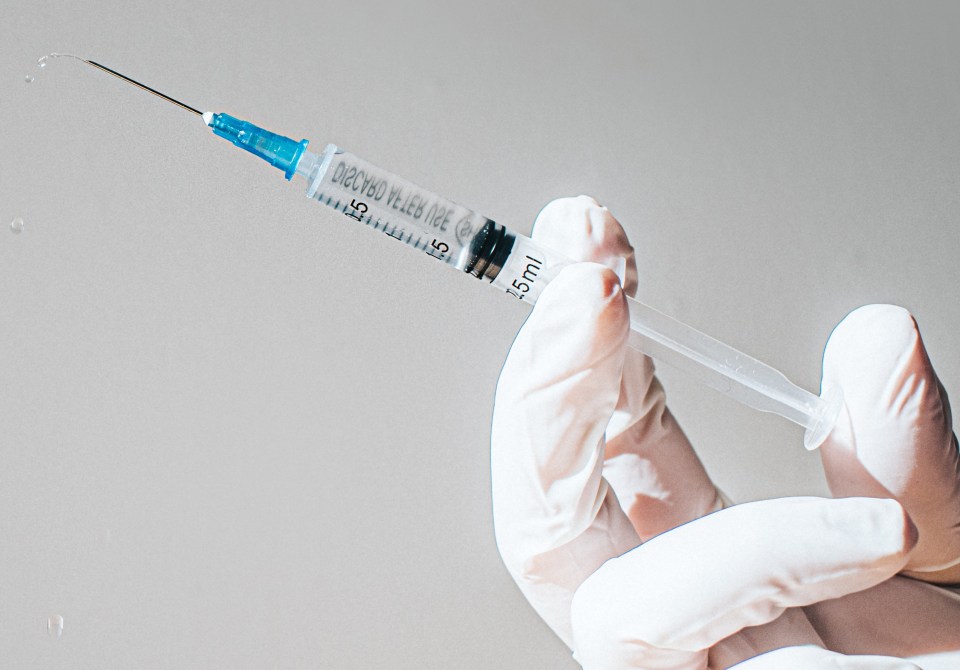SKIN cancer patients are set to get a potentially life-saving vaccine, as part of the expansion of a “ground-breaking” NHS trial.
The needle-free injection boosts the immune system, helping the body recognise, attack and ‘remember’ cancer cells – to help stop the disease from returning.
It will be given to those patients diagnosed with advanced melanoma – the deadliest form of the skin cancer, which causes 2,340 deaths each year in the UK – from next month.
It comes a week after the Prime Minister announced plans for a new health data research service, to accelerate development of therapies and medicines.
Granddad-of-four, Paul Thomas, from Hampshire, is among the first patients to take part in the SCOPE trial.
Diagnosed with advanced melanoma in 2017, the 63-year-old’s cancer kept returning, despite treatment.
Since joining the trial last year, the window cleaner’s tumours have significantly shrunk.
“I feel so lucky to be put on the trial,” he said. “Every time I go for a scan they [tumours] seem to be shrinking, which is really exciting.
“I’m really hoping for total eradication of my cancer, as opposed to being put in remission and I’m feeling optimistic.”
Cancer vaccines are an example of personalised medicine, a cutting-edge new approach to treatment that tailors therapies to patients’ genetic makeup.
Keir Starmer said: “This kind of innovation is nothing short of life-saving and I want to see more of these world-leading treatments being developed in the UK.”
The Government’s Plan for Change to cut red tape will put the UK at the forefront of medical research, the PM said.
“It will accelerate the discovery of transformative treatments and improve services for patients, driving growth across the country while making sure as many people as possible can benefit from cutting-edge treatments,” he added.
Meanwhile, Professor Peter Johnson, NHS national cancer director said these new vaccines have the potential to “revolutionise cancer care for patients – and save lives”.
“It’s incredibly exciting that the NHS is expanding its world-leading programme so more patients with different types of cancer could benefit from the development of new vaccines that could stop their cancer coming back,” he said.
The vaccine iSCIB1+, developed by Oxford-based Scancell, is the latest to be trialled under NHS England’s Cancer Vaccine Launch Pad – 10,000 patients in England are set to get their very own disease-busting jab by 2030.
The Launch Pad has already seen more than 350 patients fast-tracked onto trials for a bowel cancer jab.
Melanoma skin cancer can be deadly and it’s sadly on the rise in the UK.
Susanna Daniels
Melanoma is the fifth most common cancer, diagnosed around 17,500 times a year, and cases have risen by a third in a decade, according to Cancer Research UK.
While standard immunotherapy treatment works for around half of melanoma patients, those who don’t respond face a higher risk of their disease spreading.
Minister of State for Health, Karin Smyth, said: “As someone who has overcome skin cancer, I know that every advancement in treatment brings hope to patients and their families.”
The new DNA vaccine targets specific biomarkers that are specific to melanoma tumours, that act as a red flag to alert the immune system.
This triggers the activation of T cells in the blood, which seek out, attack and destroy the cancer cells.
It creates a lasting response, an immune ‘memory’ that helps prevent the cancer returning.
To be eligible, advanced melanoma patients who have yet to receive treatment, will first need to have a blood test to determine their tissue type.
Susanna Daniels, CEO of Melanoma Focus, said: “Melanoma skin cancer can be deadly and it’s sadly on the rise in the UK.
“We’re delighted to see progress in innovative treatments.
“The use of vaccines to treat melanoma is an exciting development and we will be encouraging eligible patients to take part.”
Major cancer breakthroughs shaping the future of treatment
IT’S a worrying fact that more than half of us will get cancer in our lifetime.
Each year around 385,000 people are diagnosed and 167,000 lives are lost to the disease in the UK . . . and experts have warned of an alarming new surge in the young.
But, in the face of rising cases, there is good news — the future of cancer care looks brighter.
Personalised medicine
Perhaps the most exciting new avenue of research is tailoring medicine to treat a patient’s cancer based on their own tumour’s genetic make-up.
Professor Lawrence Young, an oncologist who has been working in cancer research for 40 years, says: “We’ve learnt that by profiling the genetics, you almost get a barcode for an individual’s cancer.
“Just because somebody’s got the same stage and grade of cancer, doesn’t mean it should be treated the same, or with a particular combination of drugs.”
Some 10,000 patients in England are set to get their very own disease-busting jab by 2030, through the NHS Cancer Vaccine Launch Pad.
Immunotherapy
Dubbed the “biggest breakthrough since chemo”, immunotherapy harnesses the power of the immune system to fight cancer.
Antibodies seek out and mark the diseased cells for destruction but spare surrounding healthy tissue, unlike chemotherapy or radiotherapy.
Prof Young says: “We’ve known for 100 years the body tries to fight cancer with the immune system but it doesn’t really work.
“Cancer cleverly learns how to get around the immune response. It can switch off the way the immune system recognises it – but these antibodies can switch it back on again.
“Antibodies are effective alone, but where they are most effective is in combination with another type of immunotherapy.”
Targeted cancer drugs
These work more precisely to stop cancer cells from dividing and growing, while limiting damage to healthy cells – and their uses are expanding.
Prof Young says: “This is targeting the machinery of the genetic mutations that drive cancer.
“Some are targets we’ve known about for years but were difficult, until recently, to develop drugs for.
“The normal growth of our cells is controlled by switches which become mutated and permanently switched on in cancer cells.
“Now, after years of research, we have targeted drugs which can switch off these growth signals.”
Blood tests
Early diagnosis is still the best weapon against cancer and its devastating impacts.
Blood tests are becoming increasingly sensitive in spotting the disease, and can “identify minuscule amounts of DNA shed from tumour cells into the blood”, Prof Young says.
Prof Young says: “Current blood tests aren’t that great. For example, we measure the proteins PSA, for prostate cancer, or CEA, for ovarian cancer, but they’re not very specific.
“We want to do our best to cure cancer with early diagnosis, and with these interesting blood tests it might be possible to identify cancer early and remove it before we get too far.”








